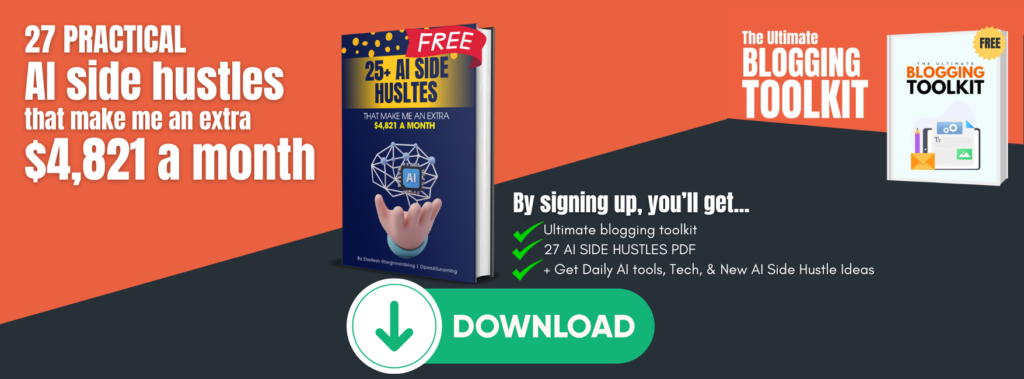Starting a blog can be very exciting, but it can also be scary and overwhelming at times. If you are starting your first blog or have been blogging for a while now, there is still much to learn about Blogging.
There are several reasons why you should consider starting a blog.
- First, it allows you to share your knowledge and experience with others.
- Second, it helps you get exposure to new audiences.
- Third, it enables you to connect with other bloggers and influencers.
- Finally, it can help you earn extra income from advertising or affiliate marketing.
Despite all, I have made several mistakes that you must be knowing before you start your blogging journey.
That being said, I’m going to cover 25 things that I wish I had known before starting my first blog. These tips will help you avoid making mistakes in your blogging venture, and they will also give you an idea of what to expect as a beginner blogger.
1. You don’t need to know how to code to start a blog
Many free tools available online make it easy to create a website without writing any code. WordPress is one of the most popular platforms for blogs because it comes pre-installed on most web hosting services. It has a simple interface and lots of tutorials on YouTube that teach beginners how to use it.
2. Don’t worry too much about SEO (search engine optimization) in the beginning
SEO is vital once you have enough content on your blog, but it doesn’t matter when you are just getting started.
The best way to build traffic to your site is through social media. When you first launch your blog, focus more on building relationships within your niche community than trying to rank high on search engines.
Related: SEO For Beginners: A Definitive Guide
“Discover 7 Secrets to Make New Sites 83% More Successful!”
3. Connect the Google search console to your blog
Google search console is a tool that lets you track all of the keywords and phrases that people enter into Google to find your content. It’s an official tool to submit your XML sitemap to stimulate your Google indexing process. With this, you can keep track of your technical SEO, DNS errors, security issues, crawl rate, etc. This is essential for optimizing your blog for organic search results.
So, whenever you start publishing content on your blog, make sure you create a sitemap and submit it to the Google search console to monitor your performance over time.
4. Use a domain name that is relevant to your niche
If you want to attract visitors to your blog, it makes sense to choose a domain name related to your topic. For example, if you sell handmade jewelry, you could choose a domain like “handmadejewelryblog.com.” On the other hand, if you sell dog food, you could choose something like “dogfoodblogname.com.”
Domain name Best practices:
- Choose a short, descriptive URL.
- Avoid using hyphens (-).
- Use only lowercase letters.
- Don’t include numbers or special characters.
- Keep it small and memorable.
5. Build an email list from day one
I recommend building an email list right away because you will be able to make a relationship with your readers by sending them regular emails. As soon as you publish your first article, send an email to your subscribers telling them about it.
Ask them questions such as: What do they think? How did they feel after reading it? Do they agree with your opinion? If not, ask them why not. By doing this, you will get valuable feedback from your audience, which will help you improve your articles.
You can start by signing up for an email subscription service such as Aweber (My top recommendation to bloggers) Or MailerLite. These services allow you to send emails to your subscribers every day, week, or month, and this is a great way to stay connected with your readers and drive more traffic to your blog.
Tips for building an email list fast:
- Create a landing page for your newsletter signup form.
- Include a call to action button.
- Add some value to your subscribers by offering exclusive content or a giveaway.
Related: 9 Free Email Marketing Tools To Help You Build An Email List
6. Write quality content
You need to write good content on your blog to gain traction. Your posts should be informative and exciting, and they should also answer questions that your readers might have.
Related: How To Write A Blog Post: A Definitive Guide
7. Don’t use copyrighted and low-quality graphics on your blog
When you upload images to your blog, make sure that they are high-resolution and free of copyright restrictions. Also, try to avoid using images from google. Instead, use free stock photos.
These stock photo sites offer thousands of royalty-free images that you can use on your website without having to pay licensing fees. Some of these sites offer various categories, including animals, nature, architecture, sports, travel, business, and many others.
8. Focus on On-page SEO
On-Page SEO refers to the process of optimizing a web page for search engines. It includes keywords, meta tags, internal linking, title tags, alt text, etc. Ensure that all the pages on your site contain unique, keyword-rich content.
You can use the Yoast SEO tool for WordPress to optimize your content for On-Page-SEO. With this, you can generate an XML sitemap to submit to Google Search Console.
On-page SEO also involves internal linking. Linking back to relevant pages within your site helps Google crawl what each page is about, and it also improves user experience and page rank.
On-page SEO techniques
- Use H1, H2, and H3 tags
- Optimize image alt tags
- Include focus keywords and semantic words in the body text
- Create a compelling Meta description
- Structure your content nicely
- Include focus keyword in URL if possible
- Include internal links and external links to your blog post
9. Optimize for Bing search engine also
Bing is one of the most popular search engines globally and has over 1 billion monthly active users. So, it makes sense to optimize your blog for search engines other than Google.
To achieve this, you need to do keyword research and include these keywords in your title tag, meta description, and URL. Also, submit your sitemap to the Bing webmaster tool to help Bing index your blog faster than usual.
10. Build relationships with other bloggers
One of the best ways to grow your blog is through networking. Start engaging with other bloggers who share similar interests with yours. Comment on their blogs, share links to their posts on social media and tag them to show them how much you appreciate their content.
This will improve your relationship with them and encourage their audience to visit your blog.
How do you build a strong relationship with other bloggers?
- Follow other bloggers on social media to keep up with their latest updates.
- Share their articles with your audience and tag the blog owner to get noticed
- Leave a thoughtful comment on their blog.
- Interview them to get more info about their blogging journey.
- Write guest posts
11. Keyword Research
Keywords play an essential role when it comes to ranking higher in SERPs. When people search for something, they expect to find websites that match their queries. If your blog doesn’t contain the right keywords, potential readers won’t find it.
However, it’s nearly impossible for a brand new blog to appear on the first page of the search engine, but it builds up gradually if you keep on doing some basic keyword research. You’ll be able to start ranking for some of these keywords after six months or so.
You can use tools like SEMrush or Ahrefs to determine which keywords your competitors are targeting. You can then use those keywords as long-tail variations to add more traffic to your blog.
12. Be consistent
Consistency is key to building trust among your audience. Readers love consistency because they know what to expect from you. They know that it will be worth reading every time they come across your post.
So make sure to publish at least twice a week. If you have several blogs, hire a content writer to create high-quality articles for you. (You can even use AI assistant tools to streamline your content writing process)
The more you post, the better chance you have to gain traction. And also, use the content planner tools to schedule your posts on social media ahead of time, so you don’t end up posting late at night.
13. Backup your blog/website
It’s always good practice to back up your website regularly and make sure to store all your files safely in case anything goes wrong. Backups should be stored offsite, preferably in a cloud storage service such as Dropbox or Google Drive. Or you can even keep a complete backup of your site on your computer.
You can use plugins like updraft plus premium version to automate the process of backing up your entire WordPress site. It will take care of everything automatically without any effort on your part.
“Build a Successful Authority Site from Scratch Even if you are a Complete Beginner”
14. Focus On One Social Media From The Start
If you’re starting, focus on one social network before moving on to another. For example, if you want to build a strong presence on Twitter, start there. Once you’ve gained followers, move onto another platform like Pinterest.
So if you want to maximize your efforts, focus on just one platform initially. For example, I started with Pinterest, and once I established Pinterest, I moved to Instagram.
15. Don’t Try to Be Perfect From The Beginning
Don’t try to be perfect from the beginning. There’s no need to rush into things. Take your time to learn about Blogging and figure out what works for you.
Perfectionism is a huge turnoff for most people. So try to avoid being too critical about yourself and others. Instead, focus on improving your skills and sharing helpful information.
Remember, Perfection is the enemy of progress.
16. Use a Content Calendar To Plan Your Posts Ahead Of Time
A content calendar helps you plan your blog posts ahead of time. This way, you can easily schedule them and ensure that you don’t miss any deadlines.
You can use content planner tools like Hootsuite, Social Sprout, or Buffer to help you manage your content calendar. These tools allow you to set reminders and send notifications when certain events happen. And also schedule blog posts on multiple social media channels in one place.
17. Consider Blogging as a Business
If you’re serious about becoming a blogger, consider it a business. You’ll need to invest some money upfront to get things going.
Over time, you’ll see how much money you can earn through advertising revenue, Affiliate marketing, and sponsorships.
Blogging is a high-return business. But you’ll need to put in a lot of hard work to achieve success.
And remember, Blogging is not an overnight success. It takes time to grow traffic, establish authority and build trust. So don’t expect instant results.
18. Avoid Installing too Many Plugins
Installing too many plugins can slow down your website speed.
This is especially true if you’re using a shared hosting account where every other user is competing for bandwidth. In this situation, you may find that your site slows down due to heavy plugin usage.
Having too many plugins increase the HTTP requests to your server, which causes unnecessary load and increase the server response time.
In addition, it can make your website look cluttered and unprofessional.
So the best solution here is to install only those plugins necessary for your site. If you have more than 20 plugins installed, you should upgrade to a VPS (Virtual Private Server) or Dedicated Hosting Account.
Related: How To Reduce HTTP Requests To Speed up Site loading
19. Focus On Quality Over Quantity
Quality over quantity is always better than quantity over quality.
Your primary goal should be to provide helpful content to keep readers coming back.
Focus on providing value-added content rather than publishing invaluable, thin, and garbage content.
It doesn’t matter how many blog posts you have; if nobody reads them, you won’t make money.
Instead, focus on creating high-quality content that will attract visitors who eventually become loyal readers or customers.
Why is Quality Content so important?
- Readers love reading quality content, so they’ll come back again and again.
- Search engines give preference to websites with lots of quality content.
- – People trust websites with great content.
- -Quality content gets natural backlinks
20. Don’t Produce Long blogpost intros
The user often skips over long intro paragraphs, and they scroll right past these sections without even noticing.
The best approach here is to keep your introductions short and sweet. Try to keep your introduction paragraph under 300 words.
That way, your readers will know what’s inside the post.
Also, try to avoid long paragraphs within the body of your article. Instead, break them up into smaller chunks, this helps to improve readability and makes your posts easier to digest.
21. Security
Security is one of the most important aspects of running a successful blog.
If you want people to visit your site, you must first ensure that it is safe from hackers.
It would be best to use strong passwords, enable two-factor authentication, and use the HTTPS protocol and security plugins like Sucuri, Wordfence & Sitelock to stop brute force attacks and malware installations.
22. Choose Hosting Wisely
There are plenty of web hosts out there. But choosing the wrong host could cost you in terms of performance, uptime, security, and customer support.
Always choose a host that has a solid reputation and offers 24/7 live chat support.
Reliable hosting like Hostinger offers free SSL certificates, email forwarding services, backup solutions, auto-installation of WordPress themes and plugins, and 24/7 support.
Related: How To Choose A Webhost Wisely
23. Don’t worry about Grammar from the start
The one secret about Blogging is that ‘You don’t need to be a writer to start a blog.’ It means you don’t need to be obsessed too much about Grammatical mistakes.
If your content conveys the right message to your audience and helps readers understand your point, they often overlook your writing and grammar skills.
So never stop starting a blog because of poor grammar skills. You can continually improve your Grammar & writing over time.
24. Have a Blogging Toolkit
Having a good set of tools for your blog is very important.
Some of them are social media management tools, SEO plugins, Security tools, analytics software, etc. These tools allow you to manage all your blogging activities, help you save time, and improve productivity.
If you’re looking for a great toolkit, Download my Blogging toolkit here!
Related: Blogging Tools & Resources
25. Don’t Compare Yourself to other bloggers
Comparing yourself to others is not a wise thing to do.
It only leads to frustration and disappointment. So, don’t compare yourself to anyone else, and just focus on improving yourself and your work.
It’s easy to compare yourself to others as a blogger. But if you do this, you’ll end up feeling inferior.
Conclusion
Blogging is a fun activity that allows you to express yourself online, and it takes a lot of patience, dedication, and hard work.
But to become a successful blogger, you have to have the right mindset, knowledge, and tools.
I’ve learned many things; I made terrible decisions and mistakes.
And here I’ve got the 25 best pieces of advice that you wish to know before starting a blog.
Have any questions or suggestions? Please let me know in the comment section below.
Please share this post on Facebook, Twitter, Pinterest, and Reddit if you find this post helpful.









